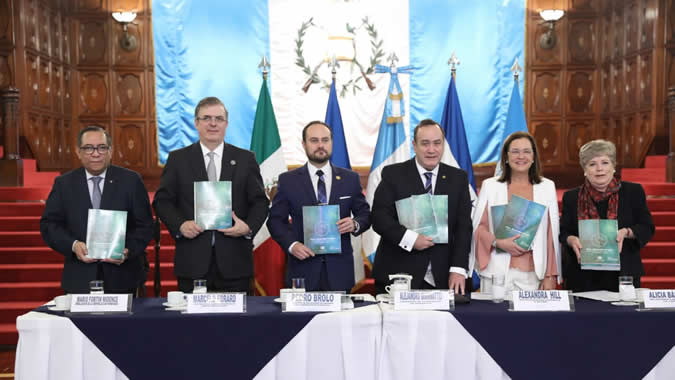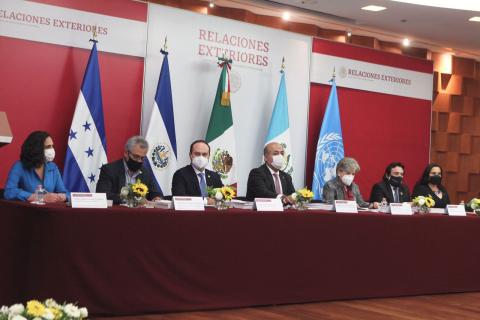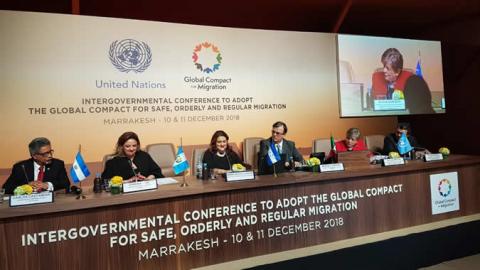Press Release
The Comprehensive Development Plan for El Salvador, Guatemala, Honduras and south and southeast Mexico is an innovative proposal that seeks to create a space for sustainable development by stimulating economic growth, promoting universal access to social rights, fostering resilience to climate change, and guaranteeing rights throughout the entire migratory cycle, Alicia Bárcena, Executive Secretary of the Economic Commission for Latin America and the Caribbean (ECLAC), sustained today.
In a ceremony held in Guatemala, which was led by President Alejandro Giammattei, the senior United Nations official presented the fourth draft of the Plan. This initiative has been adhered to by the four countries, and it will be enriched further in a joint manner with a view to achieving a definitive design, which will be determined by the countries involved with support from ECLAC and the United Nations System.
The ceremony was attended by Foreign Ministers Pedro Brolo, of Guatemala; Alejandra Hill, of El Salvador; and Marcelo Ebrard, of Mexico. Honduras was represented by Ambassador Mario Alberto Fortín.
During her presentation, Alicia Bárcena recalled that the Comprehensive Development Plan seeks to change the migration narrative, placing the dignity of migrants and human rights at the center with a human security approach and adopting a focus on the full migratory cycle: origin, transit, destination and return.
She added that the proposal explores regional synergies and integration-based approaches, it surveys and expands what States already do well with their resources, and it strengthens public capacities.
ECLAC’s Executive Secretary emphasized that the initiative contemplates 22 thematic programs and 108 projects, ready to be implemented, which entail an investment of $25 billion dollars over 5 years.
The proposal is organized around four thematic pillars: economic development, social well-being, environmental sustainability, and comprehensive management of the migratory cycle.
ECLAC’s most senior representative recalled that El Salvador, Honduras, Guatemala and the 9 states in south-southeast Mexico make up a market of 60 million people, with access to both oceans and a privileged geographical situation, great natural biodiversity and cultural diversity, with a vocation for integration, a young population, and production capacities waiting to be developed.
Finally, she reiterated her invitation for officials to participate in a donors’ conference for the Comprehensive Development Plan, which will take place during the first week of March in Mexico City.
The Comprehensive Development Plan stems from the mandate that ECLAC was given on December 1, 2018 by the Presidents of El Salvador, Guatemala, Honduras and Mexico, to draft a plan with the aim of formulating a diagnosis and presenting recommendations to advance toward a new development pattern and give rise to a new vision regarding the complexity of migratory processes.
This strategic document is the result of collaboration between 16 United Nations agencies, funds and programs that operate in Latin America and the Caribbean.
In its assessment, the Plan indicates that the structural motives and causes of migration that these countries currently endure are: insufficient economic growth with poverty and inequality, where the 10% with the greatest income obtains as much as 70 times more than the poorest 10%; high demographic growth in cities and great lags in rural areas; natural phenomena such as drought and flooding; violence and insecurity in places of origin; and the great salary gap that exists with the United States, which is the country that has become the destination for the majority of migrants.
Some of the 30 specific recommendations contained in the Comprehensive Development Plan include progressive taxation, to prioritize public investment and eliminate tax privileges, as well as the strengthening of tax administration; raising total investment to a target of 25% of GDP; leveraging remittances so they can act as drivers of productive inclusion and local development; and greater integration and trade facilitation, with an emphasis on energy, logistics, infrastructure and regional digitalization.



